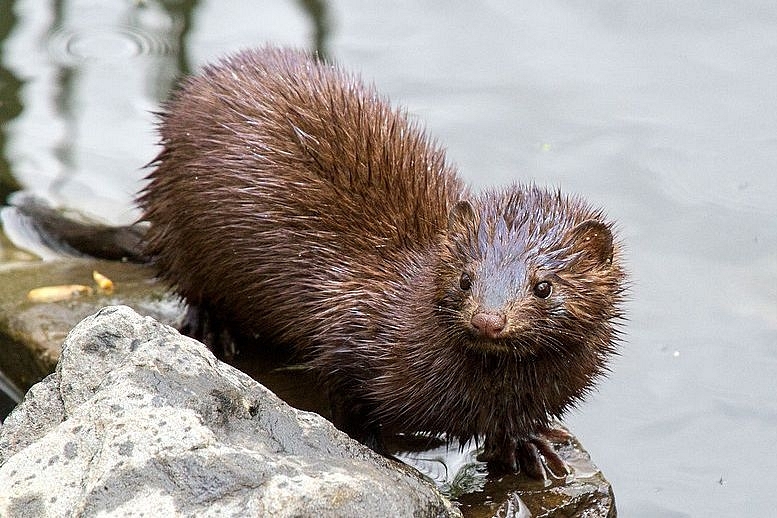Science
Carnivac-Cov: Russia Registers First Covid-19 Vaccine For Animals To Prevent Mutation
- Russian agricultural regulatory agency said Carnivac-Cov vaccine has been tested on animals, and found to be effective.

Carnivac-Cov was tested on mink.
After the development of the world’s first Covid-19 vaccine Sputnik V, Russia announced on 31 March that it had registered what it said to be the first-ever coronavirus vaccine for the animals.
While explaining the reason behind the creation of the vaccine, it said that the step was taken to prevent the virus from mutating. The mass production of the vaccine could begin this month.
The Russian agricultural regulatory agency, Rosselkhoznadzor stated that the vaccine — Carnivac-Cov —had been tested on cats, dogs, mink, foxes and other animals since October 2020. The agency also noted that the vaccine was found to be effective on them.
Konstantin Savenkov, deputy head of Rosselkhoznadzor, said: "All test animals that were vaccinated developed antibodies to coronavirus in 100 per cent of cases. It is the world's first and only product for preventing Covid-19 in animals."
How Important Is This Vaccine for Animals?
The coronavirus, which first emerged in China in 2019, and soon spread across the globe, has killed over 2,816,000 people and infected more than 128 million individuals as of now. But despite the development of Covid-19 vaccines, the mutated versions of the novel virus are posing new threats to the vaccine efficacy.
After conducting a recent investigation in China, a team from the World Health Organization (WHO) said that Covid-19 probably passed to humans from a bat via an unknown intermediary animal. This statement and previous research findings have suggested that animals played a role in this pandemic.
Even in 2020, Denmark decided to cull 15 million minks to curb the virus spread as some of them were found to be carrying a mutated virus variant. But according to the Russian agency, Rosselkhoznadzor, the development of Carnivac-Cov is expected to help prevent mutations in animals.
In a statement, the agency added that as per the Russian scientists, vaccine use can prevent the development of virus mutation. It also noted that animal-breeding facilities and companies from countries like Poland, Singapore, Austria, Greece and the US had expressed their interest in this newly-developed vaccine for animals.
This week, the military officials in Russia's second city Saint Petersburg have announced that all army dogs will receive the vaccine before being deployed at airports and participating in the upcoming Second World War commemorations, which will take place in May.
“No Need To Vaccinate Now”
Russian fur breeders and veterinarians don’t see an immediate need to vaccinate cats and dogs. A Moscow based veterinary clinic told AFP that currently, it saw no reason to vaccinate the animals because "it has not been proven that they [cats and dogs] are Covid-19 carriers".
According to the US Center for Disease Control and Prevention: “Based on the available information to date, the risk of animals spreading Covid-19 to people is considered to be low.” But it is a fact that many animals in zoos and sanctuaries had tested positive for the SARS-CoV-2 after they got the infection from an affected animal caretaker.
The head of the National Association of Fur Breeders, Nadezhda Zubkova, said that the breeders have not yet seen cases of coronavirus in animals and are not planning to vaccinate. But he said that those animals who received the vaccine during the trial period “are feeling fine” and called Carnivac-Cov “a decent vaccine”.
Support Swarajya's 50 Ground Reports Project & Sponsor A Story
Every general election Swarajya does a 50 ground reports project.
Aimed only at serious readers and those who appreciate the nuances of political undercurrents, the project provides a sense of India's electoral landscape. As you know, these reports are produced after considerable investment of travel, time and effort on the ground.
This time too we've kicked off the project in style and have covered over 30 constituencies already. If you're someone who appreciates such work and have enjoyed our coverage please consider sponsoring a ground report for just Rs 2999 to Rs 19,999 - it goes a long way in helping us produce more quality reportage.
You can also back this project by becoming a subscriber for as little as Rs 999 - so do click on this links and choose a plan that suits you and back us.
Click below to contribute.
Latest